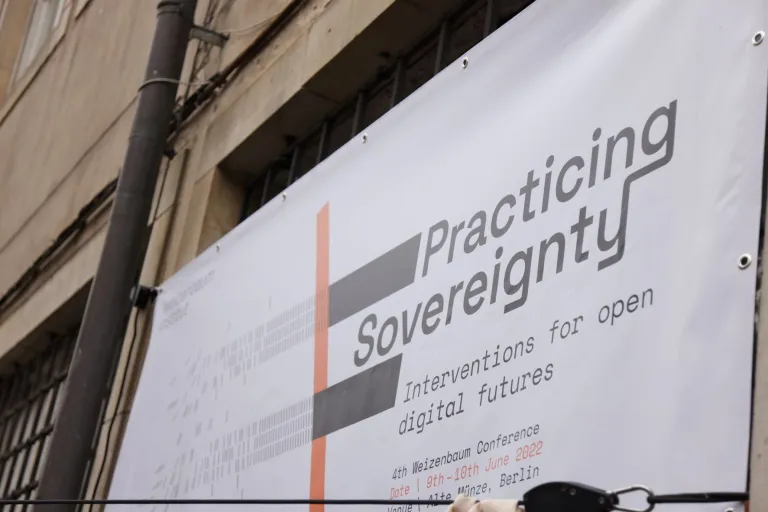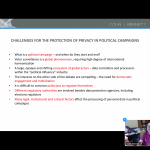Digitalisation enables political change. It affects how political decisions are made and how policies are implemented; it changes what issues are deemed political, how these issues are communicated, and how we generally organise and live democratic politics. The research group Democracy and Digitalisa-tion at the Weizenbaum Institute of the Networked Society has over the last five years explored the interplay of digitalisation and democratic self-governance. To this end, the concept of the digital constellation functioned as a cornerstone in our theoretical approach. It addresses the conditions under which politics take place in a society that is characterised by the use of digital technologies, distinguishing the levels of properties, affordances, and social configurations. This concept has served us as an epistemological guide to better understand how digital technologies acquire their social and political meaning. Thus, it provided a conceptual tool to analyse the techno-social dy-namics in their diversity as infrastructures, media, protocols, and artefacts.
In pursuing our research and developing the concept, we have been greatly influenced by many scholars working on the intersection of technology, society, law and politics. Now that the work of the group is drawing to an end, we wanted to seize the opportunity and reflect on the conceptual work by wel-coming many of those scholars who inspired much of the research done in the group for a final workshop „Democracy in the digital constellation. Interdisciplinary perspectives“. We invited them to discuss the concept of the digital constellation, its use as a tool for digitalization research, and its substantial implications for how we understand politics, law and societal developments in the digital constellation. The workshop took place on the 5th and 6th of September. You can have a look at our final program here. We once again want to thank all speakers Vincent August, Robert Seyfert, Hannah Ruschemeier, Giovanni De Gregorio, Annie Waldherr, Jan-Felix Schrape, Paula Diehl und Rahel Süß and all our guests for their input and the lively and inspiring discussion.
Bubble Talks unserer Fellows: Hannah Bloch-Wehba und Daniel Staemmler
Am Montag haben unsere Fellows Hannah Bloch-Wehba und Daniel Staemmler im Rahmen des Bubble Talks jeweils einen Vortrag zu „Public-Private Platforms“ bzw. „Digital Activism – Turning (in)to institutions?“ gehalten. Hannah hat sich in ihrem Vortrag mit dem zunehmenden Einfluss des Silicon Valley auf das Regieren auseinandergesetzt, da Technologieunternehmen nicht nur die Politik beeinflussen, sondern auch die Bedingungen für Beteiligung, Rechenschaftspflicht und Transparenz prägen. Daniel hat in seinem Vortrag Civic Tech als eine Variante des digitalen Aktivismus konzeptualisiert und hat dabei dessen Funktionen im Kontext der digitalen Zivilgesellschaft in Deutschland erläutert.
Panel auf der Weizenbaum Conference
 Die diesjähirge Weizenbaum Conference stand unter dem Motto „Practicing Sovereignty“. Gemeinsam mit Julia Pohle war Thorsten für die Organisation des Tracks “Digital Sovereignty: Terms, concepts and limitations” verantwortlich. Thorsten und Julia Pohle (WZB) hatten zwei tolle Panel, die sich um konzeptuelle wie theoriepolitische Fragen drehten. Vorträge gab es etwa von Aisha Kadiri zu digitalem Kolonialismus, von Daniel Lambach zu europäischen Diskursen oder von Ana Stefanija zu Affordanzen, die individuelle Souveränität im Kontext algorithmischen Entscheidens befördern. Und insgesamt war es eine ganz hervorragende Konferenz in der Alten Münze, organisiert u.a. von Geesche Jost und Bianca Herlo.
Die diesjähirge Weizenbaum Conference stand unter dem Motto „Practicing Sovereignty“. Gemeinsam mit Julia Pohle war Thorsten für die Organisation des Tracks “Digital Sovereignty: Terms, concepts and limitations” verantwortlich. Thorsten und Julia Pohle (WZB) hatten zwei tolle Panel, die sich um konzeptuelle wie theoriepolitische Fragen drehten. Vorträge gab es etwa von Aisha Kadiri zu digitalem Kolonialismus, von Daniel Lambach zu europäischen Diskursen oder von Ana Stefanija zu Affordanzen, die individuelle Souveränität im Kontext algorithmischen Entscheidens befördern. Und insgesamt war es eine ganz hervorragende Konferenz in der Alten Münze, organisiert u.a. von Geesche Jost und Bianca Herlo.
Workshop on Environmental Data Stewardship by Thorsten Thiel and Paola Pierri
Feb. 4th 2022 09:30-11:00 am CET
Towards Environmental Data Stewardship
The use of traditional and new types of environmental data will be crucial in the fight against climate change, as well as other related threats. The good use of all these data has enormous social benefits, but each of them brings governance challenges – privacy, secrecy, business monopolies, anti-fraud and transparency among them. To achieve the benefits we need data use to be supported by a solid governance regime that can steer collection, access, and use of environmental data. Therefore Thorsten together with Paola Pierri of Democratic Society and NYU Gov Lab are organising a workshop on environmental data governance. The goal of the workshop is to bring together researchers from the Weizenbaum Institute to share some initial insights emerging from the research, identified tensions and possible alternative governance models in the field of Environmental Data Governance with the aim of opening the discussion to experts in the field, test ideas and to ensure a range of different perspectives on data governance issues is taken into account. The results will later serve the Democratic Society and the NYU Gov Lab to make policy recommendations to the GIZ.
The workshop will take place on Friday February 4th 2022 from 09:30-11:00 am.
Academic workshop on the DSA by Amélie Heldt
Nov. 15th 2021, 3 to 4:30 pm CET
Nov. 16th 2021, 10 to 11:30 am CET
via ZOOM
PERCOLATING THE DSA PACKAGE – PERSPECTIVES FOR A DIGITAL DECADE
The EU explicitly strives to be the leading regulatory force of the 21st century on a global scale. Its potential role as a ‘global’ regulator raises fundamental questions as to the legality and legitimacy of such an agenda. Moreover, it requires a thorough analysis of the current proposals included in the DSA Package.
This workshop is bringing together scholars from law, social science and more in order to get a better understanding of the DSA Package, in detail and on a meta level. We will look at these regulatory activities from many perspectives and angles, including: fundamental rights, platform governance, accountability and transparency, digital constitutionalism, and digital sovereignty.
The workshop will take place virtually, in two sessions of 1,5 hours each on Nov. 15th, 3 to 4:30 pm CET & Nov. 16th 2021, 10 to 11:30 am CET.
You can find the agenda for the workshop and the speakers‘ information here. If you are interested in attending please register via the following links for each session.
Nov. 15th 2021, 3 to 4:30 pm CET
https://wzb-eu.zoom.us/meeting/register/tZUsfuyhrT0oE9JMYo_n8_CA5gvNrGmrX-zr
Nov. 16th 2021, 10 to 11:30 am CET.
https://wzb-eu.zoom.us/meeting/register/tZIvd-qrqjopHNDY_mgU547ysPyrdHocry7F
Feministische Theorien der Digitalisierung – feministische Theorien der Demokratie
Freitag, 15. Oktober 2021, 10:00 - 16:00 Uhr
WZB, Raum A310
Der interdisziplinäre Workshop mit Francesca Schmidt und Katharina Hoppe widmete sich feministischen Perspektiven auf Digitalisierung. Diese haben eine lange Tradition: Schon in den 80er-Jahren imaginierten Cyberfeministinnen, wie uns neue Technologien aus der binären Geschlechterordnung befreien könnten. Heutzutage gehören Feministinnen zu den Stimmen, die oft besonders früh und nachdrücklich auf die potentiell herrschaftsverstärkenden Effekte der unreflektierten bzw. unregulierten Anwendung digitaler Technologien hinweisen, beispielsweise im Kontext von Hate Speech, Überwachung oder algorithmischer Entscheidungssysteme. Diese historische Entwicklung, sowie die unterschiedlichen Arten und Weisen, wie Feminist*innen über digitale Technologien, deren Auswirkungen auf Macht und Herrschaft und das Verhältnis zur Demokratie nachdenken, wollen wir auch in der Auswahl unserer Texte abbilden.
- Haraway, Donna (1995) Ein Manifest für Cyborgs. Feminismus im Streit mit den Technowissenschaften.
- DeCook, Julia (2020) A [White] Cyborg’s Manifesto: the overwhelmingly Western ideology driving technofeminist theory.
- Prietl, Bianca (2019) Algorithmische Entscheidungssysteme revisited: Wie Maschinen gesellschaftliche Herrschaftsverhältnisse reproduzieren können.
- Asenbaum, Hans (2019) Making a Difference: Toward a Feminist Democratic Theory in the Digital Age.
Weizenbaum Colloquium with Irina Kalinka
Tuesday, 23rd of February 2021, 2 pm – 3 pm
Weizenbaum-Institut, online
 The upcoming issue of Weizenbaum Colloquium will be held by our fellow Irina Kalinka, who will give a presentation with the the title „The Political Imaginary of User Democracy“, based on her dissertation topic:
The upcoming issue of Weizenbaum Colloquium will be held by our fellow Irina Kalinka, who will give a presentation with the the title „The Political Imaginary of User Democracy“, based on her dissertation topic:
Contemporary debates about the political impact of digital platforms in the West often revolve around a central, limiting dichotomy: Does digital media revitalize or hurt democracy? This project shifts the focus to show how digital platforms are not only facilitators – of both democratic and anti-democratic endencies – but also engender their own normative conceptualization of democracy. This includes defining what information is in the public interest, what constitutes “healthy” public discourse, and what are good citizenship practices and pedagogies. What emerges from such efforts is a political imaginary I call ‘User Democracy.’
User Democracy is informed by a technocratic understanding of politics, including the valorization of data and automation, predictability, and systematization. Community and popular sovereignty are here imagined as operational and, thus, potentially programmable, which devalues the need for political contestation, inherent in questions of history, justice, and equality, to play out in a truly public setting. Instead, digital public life is facilitated for political subjects through the ‘service’ of interface-design, algorithmic filters, or user manuals. Under this framework, democracy is seen as a project of optimization and management, not common struggle. Subjects are encouraged to imagine themselves as ‚citizen-users‘ of the service of digital public space, where citizenship is an improvable and quantifiable skill – instead of a shared responsibility.
This dissertation, in contrast, argues for an emancipatory understanding of democracy rooted in the political ethos of (digital) agonism, which emphasizes that popular sovereignty is not an object to be facilitated from above, but a continuous, collective process of struggle around what it means to be in common with others.
If you are interested in attending the Weizenbaum Colloquium, please send us a mail (digidem@wzb.eu) and we will provide you with a link to the conference.
POLKOMM21: Meinungsbildung und Meinungsmacht in dissonanten Öffentlichkeiten
Freitag, 12. Februar 2021
Weizenbaum-Institut, online (hybrides Format)
Am 12. Februar 2021 findet die POLKOMM21, die gemeinsame Jahrestagung der Fachgruppe „Kommunikation und Politik“ der Deutschen Gesellschaft für Publizistik- und Kommunikationswissenschaft (DGPuK), des Arbeitskreises „Politik und Kommunikation“ der Deutschen Vereinigung für Politikwissenschaft (DVPW) und der Fachgruppe „Politische Kommunikation“ der Schweizerischen Gesellschaft für Kommunikations- und Medienwissenschaft (SGKM) statt. Das Thema der von uns mitorganisierten und am Weizenbaum (hybrides Format) stattfindenden Tagung lautet „Meinungsbildung und Meinungsmacht in dissonanten Öffentlichkeiten“. Der Fokus liegt auf der durch die Transformation digitaler Öffentlichkeiten erhöhten Komplexität von Prozessen der Meinungsbildung und des Kampfes um Deutungsmacht. Weitere aktuelle Informationen und die inhaltlichen Schwerpunkte der Tagung finden sich auf der Tagungswebsite.
Colin J. Bennett: Privacy and Data-Driven Elections
Donnerstag/Freitag, 03/04. September 2020, 17:00 - 19:00 Uhr
Weizenbaum-Institut, Raum A104
 Together with Professor Colin J. Bennett from the University of Victoria (Canada) our research group hosted a two-day online workshop on the topic of Privacy and Data-Driven Elections. We know that privacy is important for democracy. Until recently, we have known relatively little about how privacy has been compromised by democracy – by the agents that seek to mobilize, engage and encourage us to vote – or not to vote. That situation has obviously changed, rapidly and dramatically. The publicity about the activities of Cambridge Analytica (CA) and the harvesting of Facebook data through third party applications have achieved extraordinary global prominence. Together with Professor Colin J. Bennett, co-author of the report „Privacy, Voter Surveillance and Democratic Engagement“ (PDF) we spoke about the macro-effects of data-driven elections and micro-targeting and how they have surfaced in different democratic countries. Aditionally we explored the various policy solutions for the regulation of data-driven elections protection, the various roles for advocates, NGOs and different national regulators and potential future research opportunities for social scientists and legal scholars.
Together with Professor Colin J. Bennett from the University of Victoria (Canada) our research group hosted a two-day online workshop on the topic of Privacy and Data-Driven Elections. We know that privacy is important for democracy. Until recently, we have known relatively little about how privacy has been compromised by democracy – by the agents that seek to mobilize, engage and encourage us to vote – or not to vote. That situation has obviously changed, rapidly and dramatically. The publicity about the activities of Cambridge Analytica (CA) and the harvesting of Facebook data through third party applications have achieved extraordinary global prominence. Together with Professor Colin J. Bennett, co-author of the report „Privacy, Voter Surveillance and Democratic Engagement“ (PDF) we spoke about the macro-effects of data-driven elections and micro-targeting and how they have surfaced in different democratic countries. Aditionally we explored the various policy solutions for the regulation of data-driven elections protection, the various roles for advocates, NGOs and different national regulators and potential future research opportunities for social scientists and legal scholars.
Das Demokratieprinzip im Grundgesetz
Freitag, 31. Januar 2020, 10:00 - 16:00 Uhr
Weizenbaum-Institut, Raum A104
Art. 20 Abs. 1 GG erklärt Demokratie zum Strukturprinzip deutscher Staatlichkeit. Vom Bundesverfassungsgericht wird es besonders dann gerne in Anschlag gebracht, wenn es gilt, Demokratiedefizite der Europäischen Union auszumachen. Denn erst ein hinreichendes demokratisches Legimationsniveau eröffne die Möglichkeit einer weitergehenden europäischen Integration. Doch wie müssen solche Legitimationsketten ausgestaltet sein und wer ist legitimierendes Subjekt im verfassungsrechtlichen Sinn? In Ermangelung einer einheitlichen theoretischen Grundlegung, lässt sich das Demokratieverständnis von Verfassung und Verfassungsgericht nur fragmentarisch rekonstruieren. Im Workshop „Das Demokratieprinzip im Grundgesetz“ möchten wir uns der Problematik aus vier Perspektiven nähern.
- Ernst-Wolfgang Böckenförde (2004) Demokratie als Verassungsprinzip
- Brun-Otto Bryde (1994) Die bundesrepublikanische Volksdemokratie als Irrweg der Demokratietheorie
- BVerfG v. 31.10.1990 – 2 BvF 3/89 (BVerfGE 83, 60-81) – Wahlrecht für Ausländer zu den Bezirksversammlungen in Hamburg
- Jens Kersten (2014) Schwarmdemokratie – Veränderungen des Demokratieverständnisses durch Soziale Medien